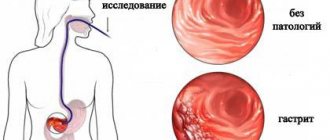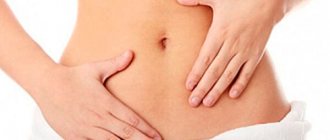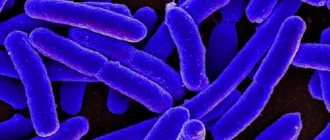Any changes in the normal functioning of a woman’s body in one way or another affect the nature of the menstrual cycle. There are pathologies that shorten its duration or change the natural process of menstrual flow, but there are internal and external factors that cause discomfort in the intimate area after menstruation. Regular itching after menstruation can be caused by everyday reasons, then you can get rid of it yourself, but most often the cause lies in an infection of the genital organs, in which case you simply cannot do without medical help.
Main factors of itching
It turns out that after menstruation, many women experience itching in the intimate area. For some, it may begin from the very first day of discharge; in this case, poor hygiene is the No. 1 irritating factor. For other representatives of the fair sex, itching in the vagina occurs already at the end of menstruation; the causes that cause it can be both domestic and pathological. According to experts, this could be:
- insufficient or excessive hygiene of the intimate area;
- development of allergic reactions to sanitary pads, household chemicals (soap, shower gel);
- medications whose instructions state that itching that occurs regularly after menstruation is a side effect;
- problems with weight (excess or significant lack);
- improper use of depilatory products;
- low immunity.
There are also specific everyday reasons that cause discomfort in the intimate area, for example, poor rinsing of chlorinated water from the body after regular use of the pool. Disruption of the microflora in the vagina due to frequent douching and uncontrolled use of medications, especially antibiotics, will lead to the same consequences.
Synthetic fibers that make up the fabrics from which underwear is made can also cause discomfort in the intimate area. If itching occurs after sexual intercourse, it could be caused by an allergy to sperm or to a contraceptive.
https://youtu.be/lvYqB7tLauk
Doctors' opinion
All doctors are inclined to think that any unpleasant symptom in the body should be a reason to go to the hospital. If this concerns a woman and her reproductive health, then she should be doubly careful. After all, diseases often begin to manifest as abdominal pain and end in infertility.
A woman who experiences an unpleasant burning sensation in the perineum during her period and after it cannot feel comfortable. This condition is an alarming sign. After all, itching during menstruation can have both superficial causes, which cannot be eliminated without much difficulty, or more serious ones, requiring medical intervention and drastic measures.
Irritation is caused, on the one hand, by insufficiently frequent washing away of the manifestations of menstruation. In such an environment, various kinds of microorganisms (bacteria, fungi) multiply quickly, causing itching. On the other hand, itching during menstruation can be associated with excessive washing and the use of various hygiene products that can negatively affect the skin, drying it out and causing a burning sensation.
The reason may be related to the use of conventional hygiene products. Unpleasant sensations may result from infrequent replacement of absorbent tampons (pads), as well as the use of those that cause an allergic reaction.
Constantly wearing underwear made of material that is non-breathable and unfriendly to the body (synthetics, satin) can become an irritant under normal conditions. On menstrual days, when the skin is most vulnerable, the risk of discomfort increases.
Pathologies
The reason for regular discomfort after menstruation in women does not always lie in everyday factors; in some cases, serious illnesses occur. We list the main pathologies with symptoms of characteristic itching after menstruation:
- urogenital candidiasis;
- inflammation of the appendages;
- human papillomavirus;
- diabetes;
- trichomoniasis;
- nonspecific vaginitis.
If a burning sensation in the vagina occurs due to urogenital candidiasis, which is popularly called “thrush,” it means that the woman most likely has a reduced immune system, against the background of which Candida fungi have become more active. The same symptoms appear in women with a sweet tooth, since this type of fungus “loves” carbohydrates. Additional signs of candidiasis: curdled discharge, burning and itching sensations in the genital area, which occur immediately after menstruation and even during them.
Nonspecific vaginitis is called inflammation of a bacterial nature, the main provoking factor of which is the growth of opportunistic flora against the background of reduced immunity or insufficient hygiene. With this disease, the genitals may become swollen and very itchy, as well as mucous and purulent discharge from the vagina.
With trichomoniasis, in addition to the itching of the intimate area, yellowish discharge with a pungent odor appears, and urination is accompanied by painful sensations, as with cystitis. With this pathology, pustules may appear on the labia, bleeding from the slightest irritation.
It is very rare, but itching in the intimate area can be a sign of a pathology of the nervous system or a mental disorder; only an experienced specialist can finally identify the cause of this condition.
Itching And Burning Before Menstruation (Causes, Treatment, Prevention)
All women know that they should monitor their monthly cycle. Deviations in the form of burning and itching during or after menstruation indicate a deviation from the norm. What are the causes of burning and itching during menstruation, and how to remove them, we will consider further.
When unpleasant symptoms appear in the female genital organ in the form of itching with irritation, most often this phenomenon indicates both local and general symptoms of various diseases.
All causes are considered in a comprehensive manner in order to identify diseases. Of course, these symptoms do not always indicate pathology.
But often they become symptoms of diseases in the form of:
- Thrushes.
- Nonspecific colpitis.
- Specific infection.
- Genital herpes.
- Diabetes mellitus.
- Kidney failure.
- Liver pathologies.
- Allergic reaction.
- Helminthiasis.
- Hemorrhoids.
Of course, in order to establish a certain disease or its absence, you will have to visit a doctor and undergo certain examinations.
Often, burning and itching in the intimate area before and after menstruation appears due to:
- vaginal dryness;
- various pathological discharges;
- discomfort when urinating;
- pain during or after sexual intercourse.
Itching is one of the symptoms of diseases. To establish the correct diagnosis, you will need to be examined. Most often he talks about the presence of:
- Specific infections that occur in the genitourinary system. In this case, special secretions appear. Their color, structure and consistency indicate a particular disease.
- White mucus with a cheesy structure indicates the presence of candidiasis.
- White-yellow color of the discharge, thick structure - the presence of gonorrhea.
- Liquid foamy discharge with a green tint - trichomoniasis.
- Creamy consistency and unpleasant (“fishy”) smell - gardnerellosis.
If they are not treated in a timely manner, they can spread to other organs, thereby causing endometritis, salpingitis and even peritonitis.
- Diabetes mellitus, endocrine pathology, which can often cause a burning sensation before or at the beginning of menstruation.
This is primarily characteristic of diabetes mellitus. When the concentration of sugar in the blood becomes higher than normal, it partially enters the female genital organ. Therefore, microbial development is possible there. In addition, glucose in the blood of the uterus creates irritation throughout its entire area. General symptoms in this case: constant thirst with dryness, weight gain or vice versa, sudden weight loss, polyuria.
- Kidney failure.
This is a kidney disease when there is a disruption in their work and retention of those harmful substances that must be removed from the body. Often during this disease, bacteria reach the uterus and settle in it, resulting in itching and other symptoms. Signs by which this disease can be identified:
- swelling may appear;
- blood pressure may increase;
- urinary density decreases;
- anemia is detected.
In the presence of such a disease, the itching goes away only when kidney function normalizes. It can be normalized only after undergoing drug therapy prescribed by a doctor.
Manifested by the release of bile or metabolic disorders in the intestinal tract. Pathogenic bacteria are released into the genital area and this leads to itching. There may also be other symptoms. So, for example, there may be pain in the ribs in the chest, an enlarged liver, and jaundice with a rash.
Candidiasis.
At the same time, not only before menstruation does a woman experience itching, white cheesy discharge, and a burning sensation in the genital area. Pain may occur.
Often it is because of the nerves that various symptoms appear, including itching. In this case, various sedatives containing herbal preparations are prescribed.
You can eliminate severe and unpleasant itching in the vagina before menstruation by examining and identifying the cause of this phenomenon. If this symptom occurs against the background of a serious illness, they treat it, and not eliminate the itching.
This particular symptom is eliminated through the use of medications, antibiotics and anti-inflammatory drugs.
It is equally important to use folk remedies in treatment. With the help of herbal baths, decoctions and infusions, you can safely remove this problem.
To enhance the effect of treatment with folk remedies, you can insert herbal tampons of chamomile with calendula and basil into the vagina. Doctors also recommend using aloe juice.
If you introduce them before your period, you can quickly get rid of a specific problem.
However, you should not completely trust folk remedies; it is important to go to a gynecologist for advice. Only after receiving all his recommendations and examination, in addition to the main prescribed medications, can you use traditional medicine.
- What is frigidity in women and men, how does it manifest itself and how is it treated?
- The following article will tell you about the causes of bleeding after sex.
general information
Many women face the problem of itching and burning before menstruation in the intimate area. There can be many reasons for this symptom, ranging from the body’s immune status and hormonal levels to serious disturbances in the functioning of internal organs. To effectively treat pathology, it is necessary to establish the exact causes of its occurrence.
When symptoms such as itching and burning appear, every woman wants to know whether this is associated with some disease. In the female body, hormone levels change several times over the course of a month. And in premenopausal women, hormonal imbalance can last for several months or even years.
- External causes of the disease are provoked by the influence of exogenous factors on the woman’s body, which include:
- underwear;
- allergy;
- insufficient hygiene;
- non-traditional sexual relations;
- foreign body.
Many women prefer underwear made from synthetic fabrics, lace and other aesthetically beautiful materials.
But few people think that for health and hygienic care of the intimate area, the best material is cotton, which allows the skin to breathe, has a soft structure, and does not create a greenhouse effect. The style of underwear is also of great importance.
Fans of thongs or bikinis should remember that this model of panties is involved in the transfer of intestinal microflora from the anus to the vagina, which may be accompanied by an inflammatory process of the genitourinary organs.
Allergy
The dermis, covering the external genitalia, is distinguished by its tenderness and sensitivity. Therefore, if this part of the body is exposed to allergic agents (synthetic powder, fabric, the surface of pads, hygiene products), then the skin immediately reacts to them with redness, itching, and swelling of the tissue.
Maintaining body hygiene is of decisive importance in intimate care. Every day a woman should wash her external genitalia at least twice a day, and more often if necessary.
It is worth noting that among modern hygiene products for the care of the intimate part of the body, preference should be given only to hypoallergenic and dermatologically tested products.
In the absence of such, you can safely use baby soap for washing.
The nature of sexual relations also affects women's health.
With a frequent combination of anal and vaginal sex, the vaginal mucosa becomes infected with E. coli, which can cause an inflammatory process of both the external integument and internal organs. An option to exclude this etiological factor is the use of barrier contraceptives when engaging in anal sex.
Doctors identify piercing of intimate organs as a foreign body. It is worth noting that the presence of jewelry can create additional friction and irritation in the intimate area. Often the appearance of itching, burning, and pathological discharge from the vagina is provoked by the installation of a contraceptive device, which is also recognized by the immune system as a foreign body inside the body.
Internal factors
- Factors of endogenous or internal origin include:
- stress;
- decreased immune defense;
- the presence of inflammatory diseases inside the body;
- helminthiases.
Stress
Nervous tension and stress have a negative impact on a woman’s overall health and well-being. Constant overstrain of the nervous system is accompanied by disruptions in the release of hormones, disruption of the menstrual cycle, and the appearance of external symptoms in the form of constant itching and burning in the intimate part of the body.
Decreased immunity
A weakened immune defense of the body facilitates the penetration of pathogenic microflora and the development of various inflammatory and infectious diseases, many of which are accompanied by vaginal discharge of various types.
Often, in parallel with reduced immunity, doctors diagnose dysbiosis of the intestinal microflora, which could be caused by medications or antibiotics taken.
This process is accompanied by the appearance of irritation of the intimate area, the occurrence of hyperemia and burning.
Multiple diseases of the reproductive system caused by various pathogenic microorganisms may be accompanied by itching of the outer labia. The most common diseases are thrush or candidiasis, genital herpes, bacterial vaginosis, and chlamydia.
Helminthic infestations can also involve the external genitalia in the pathological process. Helminths that parasitize the intestines lay eggs near the anus in the perianal folds.
Quite often they move to the labia and can even crawl into the vagina. This process is accompanied by severe itching.
A characteristic feature is the appearance of alarming symptoms in the evening and at night.
The presence of somatic diseases of the cardiovascular, respiratory, and genitourinary systems can also significantly affect women's health.
Typically, such patients are exhausted by the underlying disease and are less resistant to secondary infections.
If itching and burning of the external genitalia are caused by other diseases, then it is necessary to first treat the underlying disease that caused the alarming symptoms.
Consequences
A woman’s lack of response to such uncomfortable symptoms can not only worsen the quality of life, but also lead to irreparable consequences. Itching caused by infectious processes in the body is especially dangerous; if they are not treated on time, this can lead to the formation of adhesions in the uterus and its appendages. Due to the adhesive process, without proper medical assistance, over time, the fallopian tubes can become completely obstructed, and this complicates the onset of pregnancy and contributes to its ectopic course. Due to abdominal adhesions, problems with the development of the fetus may arise, which quite often ends in its freezing, that is, the cessation of its development.
What are periods
Menstruation is a monthly process of cleansing the female body. At this time, bleeding from the vagina occurs. This indicates the girl’s ability to bear children. During menstruation, the endometrium detaches. Its remains are excreted from the body along with the blood. The color of menstruation is bright scarlet. Clots may be observed. This is the norm. Menstruation stops only during pregnancy and breastfeeding.
Menstruation begins for the first time at the age of 10-16 years. This indicates that the body has formed and is ready for procreation. The onset of menstruation is influenced by many factors, especially hereditary predisposition.
Menstruation is accompanied by a number of symptoms. Symptoms of this natural process include:
- pulling sensation in the lower abdomen;
- breast swelling;
- increased breast sensitivity;
- discomfort in the lower back;
- excessive irritability;
- increased fatigue;
Diagnostics
Even if the itching began during menstruation, a full diagnosis can be carried out only after the discharge has stopped. To determine the cause of discomfort in the intimate area, the doctor may prescribe the following tests:
- examination by a gynecologist and therapist. Initially, the general condition of the patient, the appearance of her genitals and vaginal discharge are assessed;
- examination of the internal genital organs by palpation;
- laboratory tests of vaginal smears, general blood and urine tests. These tests help identify the inflammatory process and assess its stage;
- Ultrasound of the pelvic and abdominal organs;
- colposcopy, a visual examination of the cervix with high magnification is performed.
Only after all the above measures have been carried out and a diagnosis has been made, the doctor decides on the method of treating the patient and how to eliminate itching sensations.
Treatment
The treatment method used to eliminate itching will depend on the diagnosis given to the patient after all examinations:
- for colpitis, the use of anti-inflammatory drugs is prescribed with mandatory douching with disinfectant solutions such as chlorhexidine. Hormonal and antibacterial therapy may include drugs such as Ofor, Terzhinan or Metronidazole;
- thrush is treated with antifungal drugs, which in the vast majority are designed to boost a woman’s immunity. To eliminate burning and itching, local medications are used in the form of ointments, creams and suppositories;
- Trichomoniasis is treated with Metronidazole, and local therapy is considered useless by specialists. For this pathology, only oral medications are used;
- herpes is treated with antiviral drugs;
- for adnexitis or endometritis, it is necessary to use complex therapy, including not only analgesics, antibiotics and vitamins, but also physiotherapeutic measures.
Only a specialist can prescribe adequate treatment for any of the pathologies listed above. Self-treatment can worsen the patient’s health or remove only the symptoms of the disease, leaving the root cause, which will certainly lead to a relapse of the disease in the future.
When undergoing a treatment course, you need to maintain sexual rest, adhere to a dietary diet, if the vagina is excessively dry, use natural lubricants and regularly perform hygiene procedures.
Prevention
Every woman who experiences itching in the intimate area does not want to feel it again, so it is very important to know and put into practice the basic preventive measures that will help prevent the occurrence of such symptoms:
- you need to control the menstrual cycle;
- maintain intimate hygiene;
- do not engage in unprotected intimate relationships;
- carry out hygienic washing after each visit to the toilet;
- use special soap or gel for intimate hygiene;
- change sanitary pads every 2 hours;
- eat less fatty, spicy and sweet foods during menstrual periods;
- Do not visit the pool or sauna during menstruation.
If any uncomfortable symptoms occur in the urogenital area, you should immediately seek help from a doctor; the health of not only the woman, but also her future offspring may depend on this.








